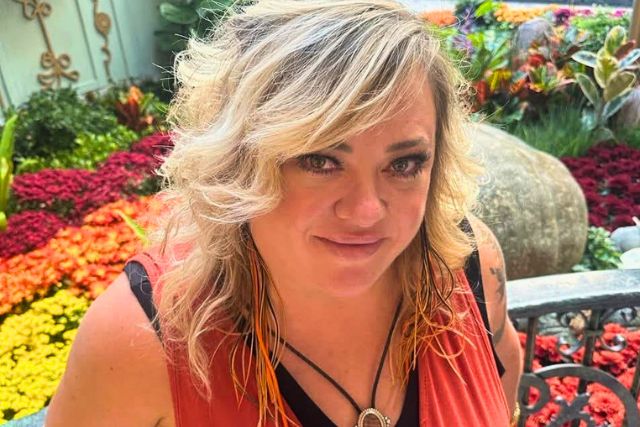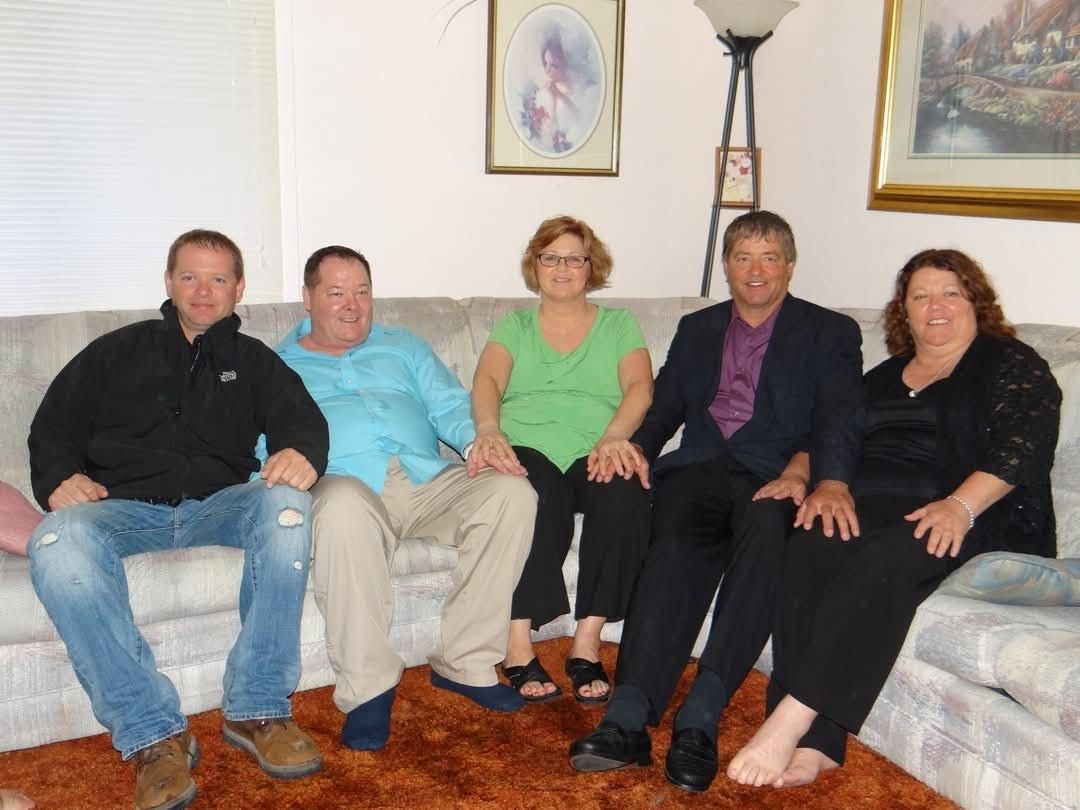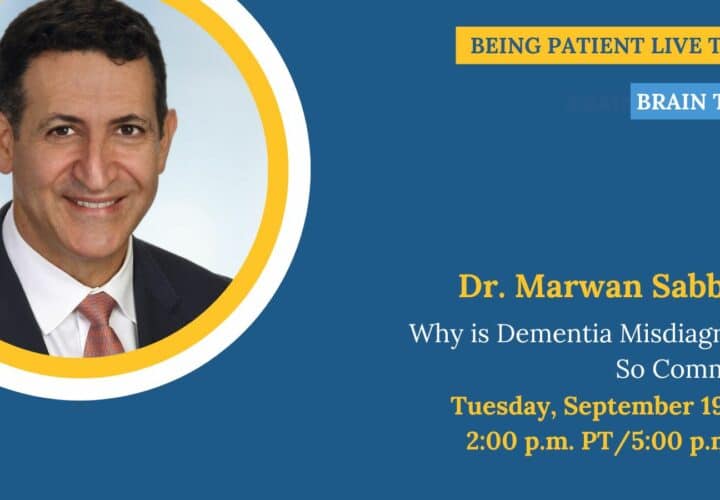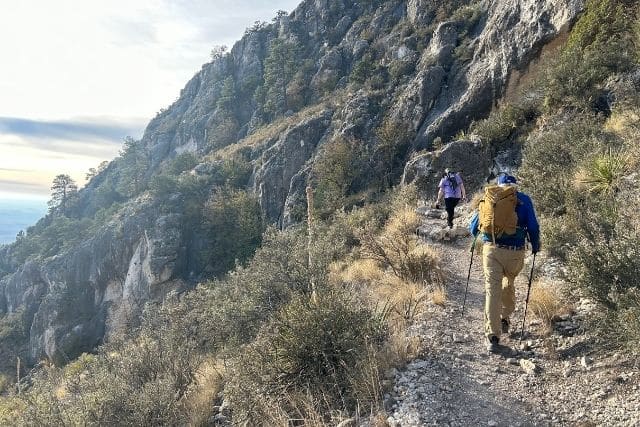Robin McIntyre inherited dozens of characteristics from her mother. One she wishes she hadn’t: the gene for early-onset Alzheimer’s disease. After diagnosis at a young age, now she’s raising awareness and fighting for others like her.
Robin McIntyre learned at age 29 that she carries the gene for early-onset Alzheimer’s disease. For this hair stylist based in Las Vegas, the realization wasn’t a complete surprise: Since 2010, 16 of McIntyre’s relatives have died of Alzheimer’s before age 60, including her mother, her uncles, and several cousins. (Her family’s story was featured in the 2017 book The Inheritance: A Family on the Front Lines of the Battle Against Alzheimer’s Disease.)
For the McIntyre family, this possible fate is in their DNA. Her family carries the Presenilin mutation, a gene that all but guarantees the onset of autosomal dominant Alzheimer’s, a rare and early occurring form of the disease. These mutations, particularly in the PSEN1 and PSEN2 variants of Presenilin, are major drivers of familial Alzheimer’s.
McIntyre, now 42, doesn’t have any Alzheimer’s symptoms as of now. But she says her health feels like a “ticking time bomb.” Her doctors have told her that they expect symptoms to begin by the time she turns 45. This has inspired McIntyre to participate in research to better understand and even treat Alzheimer’s, including clinical trials and studies such as the Dominantly Inherited Alzheimer’s Network. She is also the founder of a nonprofit dedicated to helping families like hers. In a conversation with Being Patient founder Deborah Kan, McIntyre explains what it has been like living with the early-onset Alzheimer’s gene, how it has impacted her outlook on the world, and what she’s doing to help other people who fully expect to develop Alzheimer’s at a young age. Read on or watch the video.
Being Patient: As a child, what did you know about Alzheimer’s and how did it present itself in your family?
Robin McIntyre: In my very younger childhood, the most I knew about disease was that my mom’s father had the disease. I can remember going to visit him in a nursing home and him being bedridden and unable to speak. I don’t know that I really thought much more about it until my mom’s siblings started showing some signs and symptoms. And I think that’s when the family really started to take action. Through the National Institute of Health [they] were able to do genetic testing. My mom and her four brothers all inherited the genetic mutation. But then also, my mom’s cousins. She had four cousins who all passed away from the disease as well. It was then when I was just starting college that I realized I was also going to face a 50-50 chance of inheriting the disease as well.
Being Patient: Can you tell us a little bit about your mom and her experience with Alzheimer’s?
McIntyre: I imagine that my mom probably was showing signs of the disease before we even realized it. She was in her late forties when she was diagnosed with mild cognitive impairment. She was diagnosed with Alzheimer’s disease at the age of 50, and then lived with the disease for six years and passed away at the age of 56. She spent the last two years of her life in a care facility in North Dakota, where she was in the same care facility as her brother, Doug.
Being Patient: And what about her siblings?
McIntyre: In the picture, the one on the left in the navy blue is my Uncle Dean. He’s currently living with the disease, probably in the end stages of the disease. In the white shirt is their baby brother Jamie. He passed away three years ago at the age of 52. Brian is the oldest and it’s been 10 or 11 years since he passed away at the age of 55. And then, on the end is Doug. He passed away at the age of 56, same age as my mom. They were only 13 months apart in age and he [died] 14 months after she did. It’s all been incredibly tragic. This disease has literally obliterated my whole family.
Being Patient: I can’t imagine really what that’s like to see all of these people around you succumb to Alzheimer’s. When did you decide to find out your genetic status?
McIntyre: That was a decision I made while watching all of them go through their [journeys] with the disease. I was around 29 years old, at the age where I was needing to decide if I wanted to have children or not. Knowing that I had a 50-50 chance of passing that on to my own offspring was a major decision factor in that. Experiencing what it was like as a child of someone who had the disease, I also knew how hard it is to live without a mom. I really didn’t want to put children through that.
Being Patient: How did you test?
McIntyre: I was already involved in research at the University of Pittsburgh Medical Center. And I had been through genetic counseling and knew what the risks were of finding out or not finding out. I waited a few years before I asked; I didn’t want the results to start dictating my life. I didn’t want Alzheimer’s disease to define who I was. As it turns out, it’s everything I am. I met with the medical team at the University of Pittsburgh Medical Center, and asked them to reveal my genetic status. I was with a couple of family members at the time.
Being Patient: What was going through your mind once you found out?
McIntyre: I was just feeling like knowledge was power. I wanted to be proactive instead of reactive. My mom was an amazing role model. [She] and her siblings participated in research knowing that what they were contributing to wasn’t really going to help them. What my mom didn’t realize she was contributing to was essentially going to help her own children. I kept my genetic status a secret from my dad for several years, and that [was] mostly because I just didn’t want to break his heart. I couldn’t imagine losing your wife and then knowing that your children have this risk as well. For me it just went back to the fact that knowledge is power. When I found out my status, it obviously was one of the worst days [of my life]. I’ll never forget that sick feeling that I had inside of me that lasted quite a long time. But I also knew that I wasn’t going to be a person who was just going to sit back and let it happen. I think my mom just instilled a lot of fire in me, a lot of drive, a lot of passion. I was able to use those qualities and characteristics to make the most of my adversity.
Being Patient: Tell me about how you found research projects to become involved with.
McIntyre: My mom and her siblings were first at a study at the National Institute of Health that then lost funding. My mom’s sister just kept looking for places for them to be involved in research. That’s where Pitt came into play. My family hooked up with Dr. William Klunk and Dr. Chester Mathis, who are pioneers in Alzheimer’s research and imaging. They had just learned that the disease starts forming in the brain 10 to 15 years prior to becoming symptomatic. [With us, they had] these perfect lab rats. I then became a part of the Dominantly Inherited Alzheimer’s Network (DIAN) study. I found a lot of pride in doing that work. The [search for ways to] prevent the onset of Alzheimer’s disease is what has kept me motivated.
Being Patient: We have a question from a listener: Can you speak about the delay in federal funding in Alzheimer’s research and whether you’re seeing an impact on your trials?
McIntyre: Unfortunately, yes. I’m one of 65 people in the world who are part of the longest-running study in Alzheimer’s research history. In May, our principal investigators informed us that our grant through the National Institute of Aging might not make it to the National Advisory Council of Aging for a second review, meaning that the study was going to end within a few months. Since that meeting, the National Institute of Aging has said that they are going to provide gap funding for one year. But this isn’t the time to be skimping on Alzheimer’s research. If something isn’t done to slow down or stop this disease, it could potentially bankrupt our medical system. It’s a very expensive disease. For people like myself, whose life depends on finding a cure, [a cut in funding is] something that we shouldn’t even have to be thinking about. I’ve been doing a lot of advocacy and a lot of lobbying to let people know the importance of making sure that the funding for these types of studies continues. Alzheimer’s disease affects you no matter what your political beliefs are.
Being Patient: Today, do you get checked regularly? How proactive are you?
McIntyre: I don’t get to know about what the doctors are seeing in my PET scans. What I do know from the MRIs that I’ve done, there are bad changes happening. There’s one major side effect to amyloid removal, and that is called ARIA, which stands for Amyloid-Related Imaging Abnormalities. Thankfully I have no sign of ARIA. I suppose I could go to my primary care provider and ask to have brain scans done, but it’s just not very common. They’re also really expensive. And I have to ask myself: How would [knowing more] change anything today? When I first started on this new drug trial a year ago, one of the interesting things that was happening was that I could hear the amyloid being removed from my brain. It was almost like a velcroing or a ripping sound. That was happening quite frequently. Now after being on this medication for a year, I’ve kind of noticed that that’s lessened. So I just like to believe that I hear it less because there’s less to remove.
Being Patient: Is that part of a trial you’re on?
McIntyre: I am on the FDA-approved drug Leqembi. Myself and the 65 other people who have been in the DIAN trials unit since the beginning [are on it]. We started in a double-blinded study with five years on Gantenerumab. They found enough clinical change to continue that study in an open label extension to where we knew we were on the drug and that was for three years. That study abruptly ended in August of 2023 after they were finding there wasn’t as much clinical change as some of the other drugs they were trialing. That meant we had about a year off, and the researchers knew that they couldn’t bring us this far and not continue on. That’s when we started a new study, called DIAN-ART. In this case, Art stands for Amyloid Removal Trial. We are currently on Leqembi, but we’re going to take that a step further using it prodromal to see if we can prevent symptoms altogether.
Being Patient: Let’s talk about your family again. You told me that in your generation there are about 12 children. Are you the only one who knows for sure that you carry this gene?
McIntyre: I’m the only one who has disclosed that information. Sometimes I think, “Why me?” My sister said to me after I found out my genetic status, “I think this happened to you because you can handle it.” I guess that was supposed to be a compliment. I am a strong woman. This has definitely made me stronger. There are times that I don’t want to be strong. But those days are far and few between. I don’t let this situation bring me down. It has led me to live a much more fulfilling life. I try not to say no to anything. I go on adventures. I take the vacations. I take risks. I wouldn’t change anything. People ask me if I wish I [hadn’t] found out my genetic status, andI’ve never once regretted finding out that information.
Being Patient: Tell us about the book that has been written about your family.
McIntyre: It’s called The Inheritance. It is an amazing book that tells the history of the disease, what’s currently at the time being done in research, and the story of my family’s journey with the disease, which is really quite incredible. It’s a really great read and very educational. And I’m so thankful to have that documented and for my family to be able to share their journey.
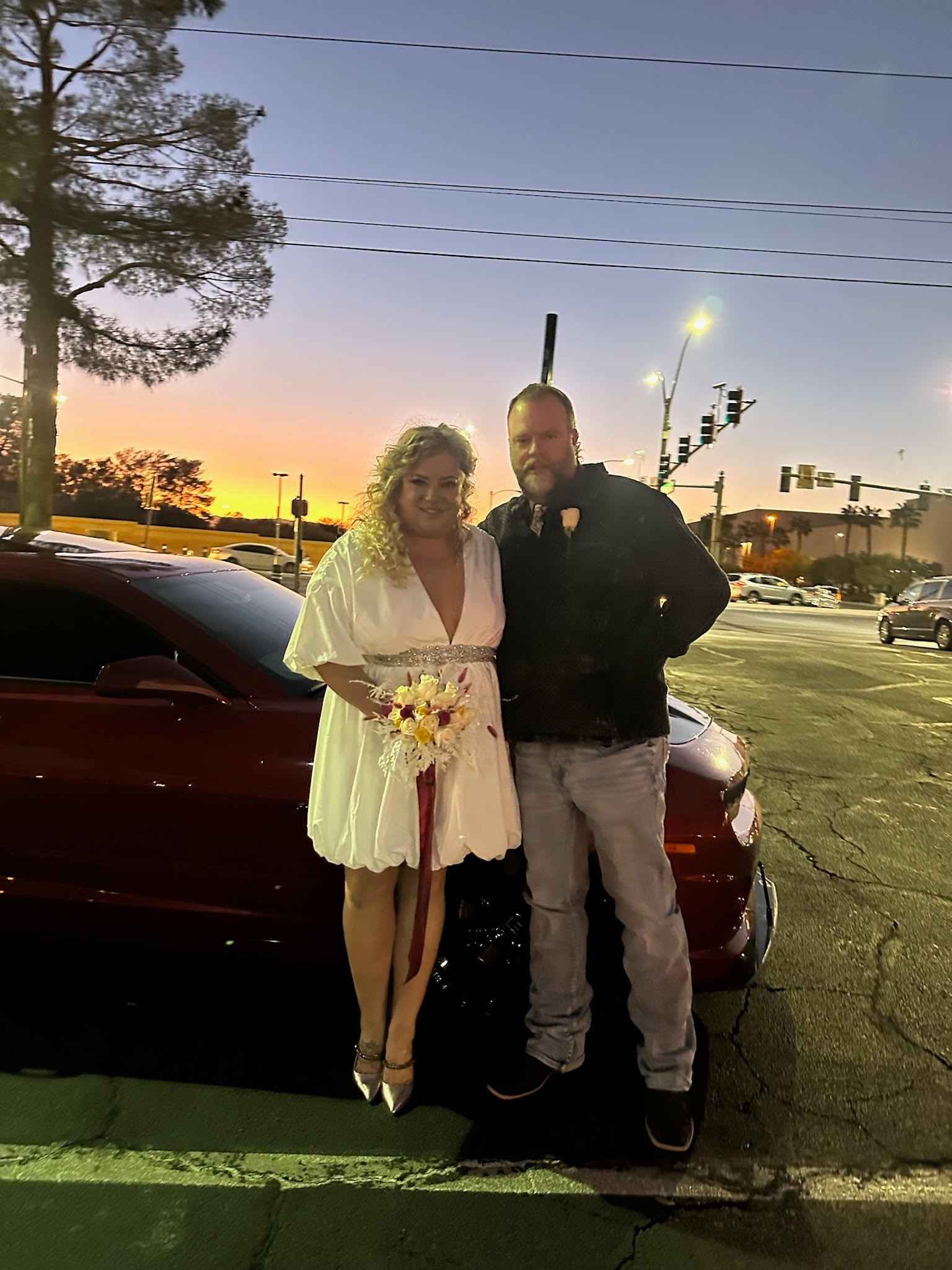
Being Patient: How about your advocacy work?
McIntyre: It was my husband’s idea to [create a] legacy. So we started the White Flower Foundation to provide support to families living with early onset familial Alzheimer’s disease. Our first goal is to be able to provide free counseling and therapy to those participants and their family members. As we talked about today, this is a heavy load and it can be very burdensome to families, especially those of us who know that we could become symptomatic in our mid- to late 40s. We should be thriving and looking forward to the future and not having to worry about if we’re going to make it to see our children or nieces and nephews graduate high school or get married.
Being Patient: Another question from a viewer: Can you speak to how time-consuming the trials are?
McIntyre: It is [time-consuming]. The Dominantly Inherited Alzheimer’s Network at Washington University in St. Louis [comprises] several studies [for which ] they are enrolling. They’re all modeled similarly. You have an annual visit where you go to your study site, and that’s usually about a four-day visit where you have a series of two to four PET scans, an hour-long MRI, a lumbar puncture, neuropsychological testing, and physical blood work. [Beyond that,] you have to have quarterly safety MRIs. And then as far as dosing goes, for me, [it’s] bimonthly. Every two weeks, a nurse comes to my house to do an infusion. And those visits usually take anywhere from four to eight hours, so that’s a whole day’s worth of work missed, twice a month, unless you’re doing them on weekends. It’s quite a commitment.
Being Patient: Why is it so important to share your story?
McIntyre: The reason why I want to share my story is [because] even if it’s not Alzheimer’s disease you’re facing, it’s important to know you’re not alone. There is a way to live a life, a happy life, with overhanging doom. It’s also important to be proactive instead of reactive, and to know that this disease isn’t just affecting our grandmas and grandpas. My estimated age of onset is 45 and I’m 42 years old. To say I feel like a ticking time bomb is an understatement. Yet I am still living a fulfilling life.
